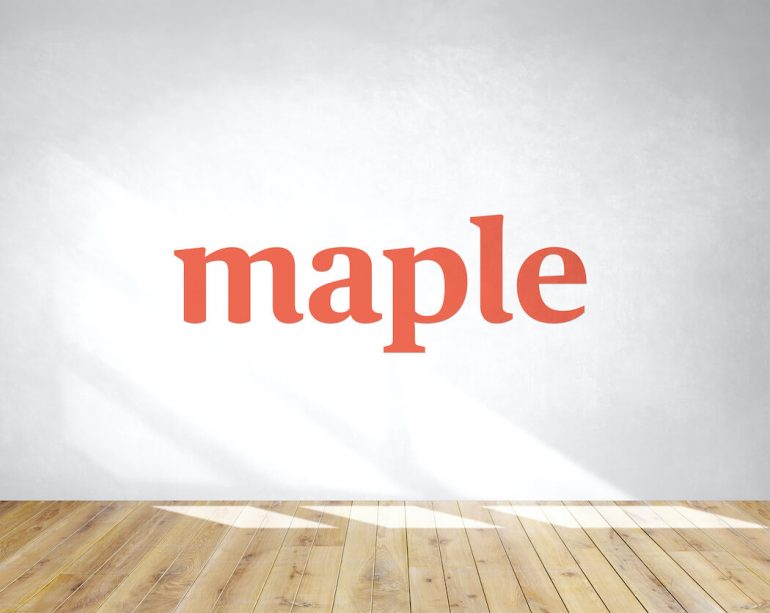With heavy competition in Canada, telemedicine startup Maple has turned its attention away from the public markets towards increasing the scale and breadth of its platform.
In an interview with BetaKit, Maple co-founder and CEO Dr. Brett Belchetz laid out his vision for the company, including continued expansion into the United States and becoming an all-in-one platform for virtual care.
Belchetz also spoke to recent reports about Maple going public, which sources have told BetaKit the company is not pursuing at this time.
“Many people would look and say, ‘there are peers that have gone public, you’re the same thing…our answer is no, we’re not even close to the same thing.”
Earlier this year, The Globe and Mail reported that Maple had hired TD Securities, RBC Capital Markets, and CIBC World Markets to lead an “expected” $100 million initial public offering (IPO) on the Toronto Stock Exchange (TSX).
Belchetz told BetaKit, while Maple “seriously considered” going public, the startup has not filed for an IPO nor has its board of directors made a formal decision to do so. Belchetz declined to comment on whether the company has hired TD Securities, RBC Capital Markets, and CIBC World Markets as underwriters, but said Maple has never attempted to speak to investors about an offering.
“Certainly, there have been many, I would say third parties, that would have suggested that it was a good idea for us, potentially, including financial institutions,” the CEO said. “So, I don’t think that would be a surprise to anybody to contemplate that as a possibility. In terms of our level of seriousness with which we look at it, I would say, obviously it’s something that we have seriously considered … but, to be clear, we have never taken it to the level of seriousness where we actually would have filed [or] would have spoken to any potential investors.”
Belchetz emphasized that the main factor determining if and when Maple goes public is the market itself.
“Much of what decides when a company goes public is actually not intrinsic factors, but its market factors,” he said. “So, a lot of the time what will make you decide whether or not you should go public is: what is happening in the market, is it a good window to go public, are investors excited about the space that you’re in, is there a lot of capital available to be invested, are peer companies in the market getting favourable valuations.”

With the market conditions not quite right for a Maple IPO, the startup is instead focused on building out the scale and breadth of its virtual care offering.
“I think many people would look and say, ‘there are peers that have gone public, you’re the same thing,’” said Belchetz. “And our answer is no, we’re not even close to the same thing. We’ve got a very different strategy and a different perspective on what the opportunity is. Even in so far as that some of the others … [serve] only one component of the market, which is the employer and insurer market, versus we believe that we should be serving everybody.”
Maple currently offers virtual doctor appointments for individual customers as well as business clients for both primary and specialized care. Maple also works closely, and has partnerships, with insurers and brokers.
Now, Belchetz says Maple has its sights set on expanding beyond reactive to proactive virtual care, such as supporting patients with chronic conditions before their needs become urgent. The startup is currently focused on developing those proactive products, and, in June, brought on Marc Caltabiano as the chief product officer to lead those efforts.
RELATED: Dialogue makes acquisition as fellow Québec startup Foko Retail bought by Michigan-based firm
Maple hopes to distinguish itself from fellow leading virutal care provider Dialogue and other specialized offerings like MindBeacon by becoming an all-in-one platform. Belchetz contrasted his company’s approach to competitors by explaining that people prefer the food delivery app that offers more than one type of cuisine.
“Healthcare is no different. In fact, healthcare is even more strongly aligned on that as there is really a true network effect,” the CEO said. “If I have a mental health problem, I am going to get way better care for my mental health care if I’m getting my mental health care in the same place where my primary care is occurring, where my endocrinology care is occurring, where even my skincare is occurring. All of these things tie in very closely together.”
“Anybody that goes into healthcare, especially in the virtual space, that believes that a single type of solution is going to provide the best care … I think that they’re absolutely misunderstanding the nature of health care,” Belchetz continued. “Healthcare is all about an integrated approach where the different kinds of providers can share [information and records] with each other.”
In addition to expanding its offerings, Maple is also working to grow its customer base through expansion into the United States.
Belchetz confirmed to BetaKit that Maple has already been testing its products in two states, Florida and New York, where an existing Canadian insurance client has operations. By moving into those two states, alone, Maple has already doubled its addressable market size.
With two million people using its platform in Canada, Maple sees the opportunity to significantly increase that by increasing its presence in Florida, New York, and beyond.
“It’s a lot of work, there’s incredible legal and regulatory complexity to expand into foreign markets, even as a state-by-state expansion. Just to go from one state to another is incredibly complex,” said Belchetz. “It took a lot of time and a lot of effort [to set up in Florida and New York]. Scale them us is something that we can do very quickly now that we’re already there.”
It’s that need to scale, and the development of new products, which may lead Maple to eventually raise further financing. Currently, the startup has a solid runway with $75 million CAD from Loblaw Companies Limited through its subsidiary, Shoppers Drug Mart, which invested in Maple late last year after striking a deal to provide virtual care services. Belchetz told BetaKit that Maple would consider all its financing options when the time comes to raise, both private and public.
Maple’s expansion plan is aggressive given the competition it faces in Canada; it may also be necessary.
RELATED: Toronto became a healthtech hotbed in 2020
The pandemic forced provinces to make it easier for individuals and doctors to access virtual appointments, which heavily influenced the growth of companies like Maple. However, that easy access to virtual care is now in question in parts of Canada, as provinces debate whether to extend the temporary billing codes that make it possible for doctors to bill for virtual appointments.
While some provinces, like Alberta, have made the billing codes permanent, others like Nova Scotia are questioning whether or not to make the same move, and Ontario is coming up on the September 30 expiration date for the program. In provinces like Quebec, there is a push to have only family physicians and general practitioners able to provide the virtual care appointments.
While nothing is for certain, a provincial rollback would present a huge cap on the growth prospects for virtual care platforms operating in Canada, making markets like the US more attractive.
“The inability of government to decide which way they’re going to go in the long run can make it very difficult for companies, such as ourselves, to decide where to allocate our resources and what strategy to pursue,” said Belchetz.
Despite the challenges, the CEO called Canada a “wonderful launching pad” for Maple. “We can really start to take what’s been a Canadian success story and turn it into an international success story,” said Belchetz. “And that’s what we’re focused on.”
With support from Douglas Soltys.
Feature image courtesy Maple

